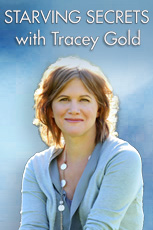Tracey Gold is a well known Hollywood name. She’s known for he long time role on the series Growing Pains but she’s almost just as well known for her public battle with anorexia. Gold was one of the first celebrities to go public with her disease in the 90’s and since has been an advocate for educating people about eating disorders. Taking that role to another level, Gold has recently debuted a show on Lifetime titled Starving Secrets with Tracey Gold. In the unscripted series,  Gold works one-on-one with women struggling with eating disorders. The show is aimed at helping these women who are in life threatening situations, however, criticism has risen. Many fear that Starving Secrets, and shows like them, may do more harm than good.
Gold works one-on-one with women struggling with eating disorders. The show is aimed at helping these women who are in life threatening situations, however, criticism has risen. Many fear that Starving Secrets, and shows like them, may do more harm than good.
In the dark world of eating disorders, like anorexia and bulimia, there seem to be a lot of secrets. The patients who struggle tend to be very reclusive and hidden. They basically have to be, because if the world saw what they were doing, someone might try and stop it. Critics fear that the show will provide more secrets for the afflicted to use, almost as if the show will become a new guide book or manual to further their disease. Professionals fear that while the show truly wants to help, it may inadvertently trigger viewers or even challenge those struggling to get competitive. For example, if the woman on the show is only eating 800 calories a day, the viewer may strive to only eat 500. Eating disorders are tricky and it’s very debatable what will help and what will hurt.
Brooke Randolph, a licensed mental health counselor, shared her thoughts about the show.“I agree with the other experts who are concerned that this may pose more danger than potential good. Those who suffer from eating disorders are often looking for new tactics and ideas to help them lose weight. The road to recovery is long and complicated, and it cannot be fully displayed in a single episode or even season. Ms. Gold likely wants to help others feel less alone in their suffering and make a difference to as many as she can. Unfortunately, like so many endeavors, the best of intentions can actually cause more harm than good.”
But what about someone who’s lived through an eating disorder- someone who made it to the other side and has had long term recovery? What are their thoughts about a show like this?
Kristi Eaton was first hospitalized for her eating disorder just a few days after her eleventh birthday. She struggled through different treatments for the next few years before she finally recovered. What does she think about the show acting as a catalyst to set off eating disorders?
“While I agree with the therapists that this could be triggering and cause harm, I think I agree more with Tracey’s thinking. When you are in that spiral, anything is going to trigger you. An eating disorder is very, very different than a diet. It’s not something that can be triggered by watching someone else. You already have to be headed down that path for it to go into a full-blown eating disorder. Watching someone exercise or count calories is not going to push you over the edge.”
As the show may also act as a tip source to those struggling, Eaton mentioned how treatment should be just as, if not more, a concerning source. “Yes, you may get tips, and I do think that is a concern with a TV show. But it’s also a concern for treatment, too. I gained many tips from my time in treatment. I was a fairly inexperienced anorexic because I was so young. It was in treatment that I learned from other girls that I should have ‘fear foods’ and that I could hide stuff in my clothes or drink a lot of water before the morning weigh-in to trick the nurses at the treatment center.”
 Eaton had further thoughts on gaining tips. “I don’t think that by learning those tricks it prolonged my treatment, because I wasn’t ready at that point to overcome it. It wasn’t until I reached a point within myself and decided I wanted to get better that I truly started recovering from it.”
Eaton had further thoughts on gaining tips. “I don’t think that by learning those tricks it prolonged my treatment, because I wasn’t ready at that point to overcome it. It wasn’t until I reached a point within myself and decided I wanted to get better that I truly started recovering from it.”
In regards to the show’s helpfulness, Eaton considered all the viewers and who might truly benefit. “I don’t know if the show will help girls with anorexia or bulimia- they will try to convince themselves that what they’re doing isn’t the same thing. People with eating disorders are expert deniers. But I think the show could help educate parents and friends of people who may have one or are showing signs of disordered eating. They may learn about the illness and realize that their daughter, girlfriend or best friend is teetering on the brink of one and be able to offer support to them.”
Tracey Gold responded to the criticisms by saying, “I think when anyone sticks their neck out and tries to do something, it’s easy for people to kind of sit back and just critique it and say there’s something wrong with it, but I think it’s hard to critique something you haven’t seen,” she said. “And also, I’ve been frustrated and disappointed with the progress the eating disorder community has made, so I say, why not try something different?”
